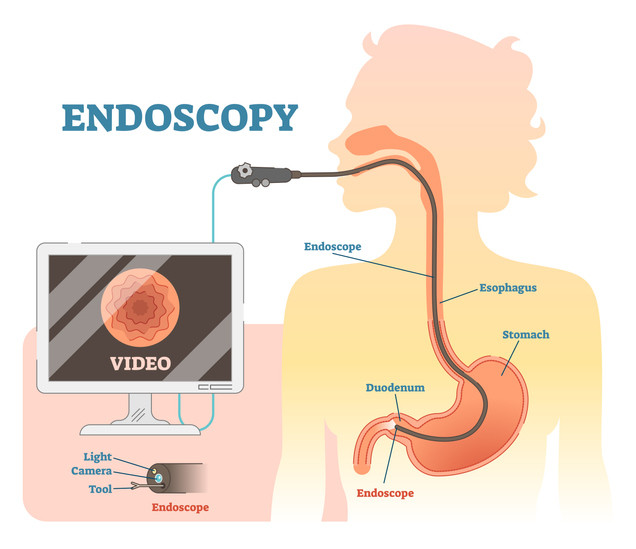
When you visit an endoscopy specialist, or gastroenterologist, for an upper endoscopy, they will be able to examine your entire digestive system using a camera that is usually placed at the end of a long, flexible tube. This procedure is done to detect or even treat conditions that affect the stomach, small intestine or the esophagus. As the specialist views your digestive system through a video monitor, an endoscopy is said to be more accurate than an x-ray film.
Apart from detection, an endoscopy specialist can use the procedure to obtain small tissue samples, called a biopsy that will help to distinguish between malignant or benign tumors. Remember, biopsies are not only subjected to cancer detection tests but can be used for other reasons too. For instance, they can be used to detect ulcer-causing bacteria. While an upper endoscopy sounds somewhat complex, it will only cause you little to no discomfort and it is an out patient procedure.
How an Upper Endoscopy Can Help Detect Digestive Diseases
As previously discussed, an upper endoscopy is done when an endoscope is passed through the mouth to the stomach, esophagus, and duodenum (upper intestinal tract). This procedure will be done when you are under sedation. Thus, you will not be able to feel any kind of pain or even be actively present when the procedure is being done.
This procedure helps in identifying and treating disorders or diseases like:
- GERD and Barrett’s esophagus
This occurs when gastric acid flows into the stomach. This condition damages the lining of the esophagus. It also causes the abnormal growth of cells that are often malignant. If you have symptoms like heartburn, nausea or regurgitation then an upper endoscopy will be performed. The light from the endoscope will highlight abnormal tissues then testing can begin.
- Ulcers and inflammation
Conditions such as gastritis, duodenitis, and esophagitis cause inflammation to the digestive system. Inflammation further leads to the stomach or duodenal ulcers. Symptoms like belching, vomiting and bloating or stomach pain will call for an upper endoscopy.
- Esophageal stricture
This is the narrowing of the esophagus that ultimately blocks the passage of fluid and/or food into the stomach. When you suffer from swallowing difficulty, vomiting and even shortness of breath, an upper endoscopy will most likely detect an esophageal stricture. Therefore, this is a life-threatening condition.
- Esophageal varices
When your esophagus walls rapture and bleed you may experience bloody stools or even vomit blood. An upper endoscopy will not only detect this condition but also help in treating it.
The detection of digestive diseases is done as follows:
- Fiber optics is used to shine white light through the intestinal tract. This is important because it ensures that there is good visibility on the digestive system.
- Once the endoscope reaches the appropriate point then the camera that is attached to it provides real-time video imaging during the entire period of the examination. This way, an endoscopy specialist will be able to get a good view of any problematic areas.
- For further tests to be conducted, and to know exactly what you are suffering from, a suction device is used to collect specimens and suck fluid that will be later taken to the laboratory for testing. Biopsy forceps are used to collect any underlying tissues while snares remove any polyps or growth.
If necessary, a needle can be used to inject the medication. Also, in cases of internal bleeding in the digestive system, clips can be placed on the bleeding lesions courtesy of this procedure.
Important Things to Remember
Before your upper endoscopy, it is important to know the following:
- Whether you have underlying health problems
The specialist should know whether you are pregnant or are suffering from health conditions like cancer or heart disease. With this information, the specialist will take the necessary precautions during the procedure.
- Whether you have any allergies
By informing your physician or endoscopy specialist about the allergies you may have and the medications you are taking, they will determine whether you should continue taking your dosage or discontinue it before the endoscopy.
- The risks of the procedure
Risks like bleeding, adverse reactions and tearing of the area being examined may occur during the endoscopy. While risks are minimal and uncommon, it is important to be well-informed before the procedure.
Bottom Line
An upper endoscopy is a gateway that will ensure your digestive system is working as well as intended. If you have any pain that is unexplained, fever, chills, bleeding or vomiting then you should consider an upper endoscopy. It will let you know whether you have anything to worry about. Even better is the fact that you will be able to detect any disease and infections and stop it dead in its tracks.